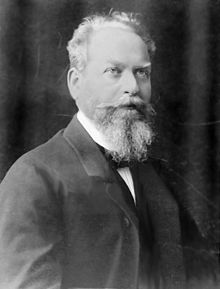Edmund Husserl
From Geography
| Line 67: | Line 67: | ||
* ''Page added to Category 'Key Thinkers' and 'Persons' by Robert-Jan Ruifrok -- [[User:RobertJanRuifrok|RobertJanRuifrok]] 15:04, 26 October 2012 (CEST) | * ''Page added to Category 'Key Thinkers' and 'Persons' by Robert-Jan Ruifrok -- [[User:RobertJanRuifrok|RobertJanRuifrok]] 15:04, 26 October 2012 (CEST) | ||
| - | * ''Page enhanced by Kasper van de Langenberg 30/12/12'' | + | * ''Page enhanced and photo added by Kasper van de Langenberg 30/12/12'' |
Latest revision as of 20:18, 30 December 2012
Edmund Husserl [1]
Edmund Gustav Albrecht Husserl (German pronunciation: [ˈhʊsɛʁl]; April 8, 1859, Prostějov, Moravia, Austrian Empire – April 26, 1938, Freiburg, Germany) was a mathematician and philosopher who is deemed the founder of phenomenology. He broke with the positivist (Positivism)orientation of the science and philosophy of his day, believing that experience is the source of all knowledge, while at the same time he elaborated critiques of psychologism and historicism.[2]His First work (philosophy of arithmetic) appeared in 1891. In this work Husserls combined his mathematical, psychological and philosphical competencies to attempt a psychological foundation of arithmetic[3].In 1900 he published his first phenomenological work.
Contents |
A short Biography
- 1859 Apr 8 Edmund, the second of four children, born in Prossnitz (or Prostejow, Moravia)
- 1876-1887 Years of Study http://geography.ruhosting.nl/geography/skins/common/images/button_image.png
- 1887-1901 Years at University of Halle as Privatdozent
- 1901-1915 Years at University of Göttingen as außerordentlichen Professor
- 1916 -1928 Years at University of Freiburg
- 1928 Mar 31 Husserl retires
- 1938 Apr 27 Husserl dies at 5:45 am in Freiburg
His contributions to the philosophy
Edmund Husserl is probably most well known as the father of phenomenology. Phenomenology, in Husserl's conception, is primarily concerned with the systematic reflection on and analysis of the structures of consciousness, and the phenomena which appear in acts of consciousness. Such reflection was to take place from a highly modified "first person" viewpoint, studying phenomena not as they appear to "my" consciousness, but to any consciousness whatsoever. Husserl believed that phenomenology could thus provide a firm basis for all human knowledge, including scientific knowledge, and could establish philosophy as a "rigorous science" [4]
The term that Edmund Husserl uses for this 'firm basis for all human knowledge 'is: Life world. In other words: In order to find the universal horizon common to all humanity we must be objective. But because we are subjective beings we can't be objective. However, when we compare different subjective meaning of people we might find a Life world, universal horizon common to all humanity.[4]Edmund Husserl, framed his inquiries very much as a reflection upon the dominant natural attitude in which scientific positivistic researchers ignored the question of their own involvement in the research process (Cloke et all(1991). Husserl conceived his project as both a philosophical science and a radical reflection on the foundations of all other sciences (Cloke et all, 1991). In his view humanistic geographers must use the drew of his phenomenology to get the true essences of the object under study. The researcher should be reintroduced into the geographical research process.
Influence of phenomenology
Phenomonelogy is still important in modern day science. The main reason of this is the fact that, because of the influence of phenomonelogy, rationalism and empiricism have derived. (Husserl, 1970)
Links
- Edmund Husserl "Collected Works Volume One, Phenomenology and The Foundations of the Sciences"
- Edmund Husserl "The Idea of Phenomenology"
References
- Unknown. Retrieved 2010 September 29 from http://en.wikipedia.org/wiki/Edmund_Husserl
- B. Sandmeyer. (2003). Husserl, Edmund 1859-1938. A Schematic biography. Retrieved 2010 September 29 from http://www.husserlpage.com/hus_bio.html
- Unknown. Retrieved 2010 September 29 from http://en.wikipedia.org/wiki/Phenomenology_(philosophy)
- Cloke, Philo & Sadler(1991)Approaching Humam Gepgraphy. London: Paul Clapman.
- Husserl. (1970) 'Phenomenology' Evanston: Northwest University Press
Contributors
- Page enhanced by Pieter van Luijk - October 15th 2012
- Page added to Category 'Late-modernity' by Anke Janssen - October 16th 2012
- Page enhanced by Lars Paardekooper - 23 October 2012
- Page added to Category 'Phenomenology' by Iris van der Wal - 15:59, October 25th 2012
- Page added to Category 'Key Thinkers' and 'Persons' by Robert-Jan Ruifrok -- RobertJanRuifrok 15:04, 26 October 2012 (CEST)
- Page enhanced and photo added by Kasper van de Langenberg 30/12/12
